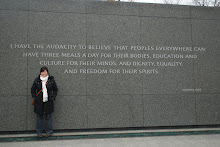 The Boy from Palmerola
The Boy from PalmerolaHe hates Honduras.
Heat
dripping like boredom
from his neck.
cupped
hand on his chin.
Useless
gun
listless
on his lap.
Useless
base,
missiles,
pumped with
steel and men.
Sandinistas,
Communism,
Always these dragons of ideologies
Always those contra liberal democracies…
Oh, the would-be corruption of
Catracho communism!
Thank Ron!
Thank him for
freely elected presidents who
make a point to
never fulfil false
promises. Who
only use the
F-16s
occasionally.
(The poor, crawling from shacks
wave
away maquila clouds,
wipe
oppression from their eyes and
watch
their leader hurtling by
a spoiled
Prince
on a pony from the King.)
Thank Ron, but by George!
The boy from Palmerola
helps the local economy every
Saturday
-come morn he gets
Sick
again for home-
And by George!
what blue eyes
these cipotes have!
The boy from Palmerola
thinks of leaving
bad beer, short stocky girls,
mosquitoes, sweat,
dark mountains and dirt,
He thinks of leaving.
-It´s been 30 odd years-
But there are dragons to slay.




